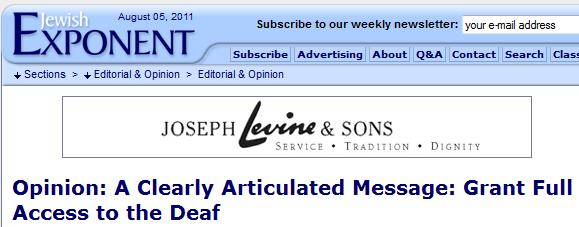 Jewish Exponent
Jewish ExponentJuly 27, 2011
The Conservative movement, through its Committee on Jewish Law and Standards, has taken a historic step in acknowledging that deaf and hard-of-hearing people are entitled to stand with the Jewish community as equals. Not only did the law committee vote to recognize the users of sign language as equals, it also issued a mandate, or teshuvah, that synagogues and organizations must strive to be accessible to all.
“The new teshuvah, which passed on May 24, reads in part:
The Committee on Jewish Law and Standards rules that the deaf who communicate via sign language and do not speak are no longer to be considered mentally incapacitated. Jews who are deaf are responsible for observing mitzvot. Our communities, synagogues, schools and camps must strive to be welcoming and accessible, and inclusive. Sign language may be used in matters of personal status and may be used in rituals. A deaf person called to the Torah who does not speak may recite the brachot [blessings] via sign language. A deaf person may serve as a shaliach tzibbur [prayer leader] in sign language in a minyan whose medium of communication is sign language.”
The Jewish Deaf Resource Center applauds the law committee, notably Rabbi Pamela Barmash, for taking on this responsibility, writing the teshuvah and recognizing its importance in approving it.
Such a mandate is historic in that it grants full access to a marginalized group of Jews. The concept of providing access to those who are deaf or hard of hearing is new for many organizations.
“Communication access,” as this is called, includes qualified sign language interpreters trained in Jewish liturgy, real-time captioning in which someone types the spoken message on a large screen, or auditory systems that amplify what is said and either works with hearing aids or a headset system worn by users.
Many organizations often are hesitant to provide communication access due to costs that are not anticipated in their budgets. But there are ways to minimize such costs and maximize this needed access.
More important, many organizations do not realize the great number of people affected by a lack of such access. Most deaf or hard-of-hearing individuals have immediate family members who are hearing. When one person in the family is without access, the entire family often is deprived of the opportunity to share Jewish communal experiences together.
Deaf children who become parents, generally to children who can hear, are unable to share positive Jewish memories with their kids. The cycle repeats when the hearing children become parents.
The Jewish experience created by these hearing parents for their children often is similar to the one they experienced with their own parents — one of limited or no participation in communal life. Denying access has a ripple effect.
To create a culture in which all Jews are welcome, organizations must develop policies that require communication access throughout the organization. Having such policies in place helps the organization respond appropriately to a request for communication access at all levels.
In order to implement the mandate set forth by the Conservative movement, the larger community must work with the deaf community to create appropriate communication policies and access.
Only with such collaboration can we end the adverse ripple effect and create an accessible Red Tent that is a welcoming home to all. u
Alexis Kashar is president and Naomi Brunnlehrman is a co-founder of the Jewish Deaf Resource Center, a national advocacy organization.
Source: www.jewishexponent.com/article/24065/Opinion_A_Clearly_Articulated/





